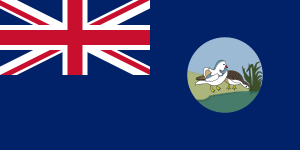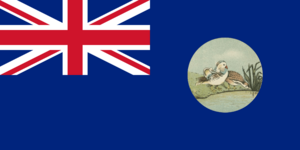Flag of Weihaiwei facts for kids
The flag of Weihaiwei was the official flag used when the area of Weihaiwei was rented by Britain. This happened between 1903 and 1930. The flag was a British blue ensign (a special type of British flag) with a picture of two Mandarin ducks on it.
History
In 1898, the Chinese Empire rented the port of Weihaiwei (威海衛) to the British Empire. This agreement was for 25 years. At first, Weihaiwei did not have its own special flag.
However, the British leader of Weihaiwei, who lived on Liu-kung Tao (劉公島), used a Union Jack flag. This flag had a badge with a Chinese imperial dragon on a yellow background.
In 1902, the new Commissioner, James Stewart Lockhart, asked the Colonial Office (a British government department) for a new flag. He felt it was not right to use a Chinese national symbol like the dragon on a British flag. The dragon was the symbol of the Qing dynasty at that time. He suggested using Mandarin ducks instead.
After his request, King Edward VII approved the new design in 1903. This new design was used for both the Commissioner's flag and the main blue ensign flag. It was also allowed for merchant ships. In 1930, the rental agreement ended. Weihaiwei was given back to the Republic of China. During the handover ceremony, the British flag was lowered, not the Weihaiwei flag.
Design
The flag was a British blue ensign. This means it was a blue flag with the Union Jack in the top left corner. On the right side, it had a special badge. This badge showed two Mandarin ducks.
One duck was a male in the front, and the other was a female behind it. They were drinking from a stream. They stood on a bank covered with reeds.
Mandarin ducks were chosen to replace the Chinese dragon. This was a common practice for British colonies. They often used pictures of local animals or plants as symbols on their flags.
 | Kyle Baker |
 | Joseph Yoakum |
 | Laura Wheeler Waring |
 | Henry Ossawa Tanner |





